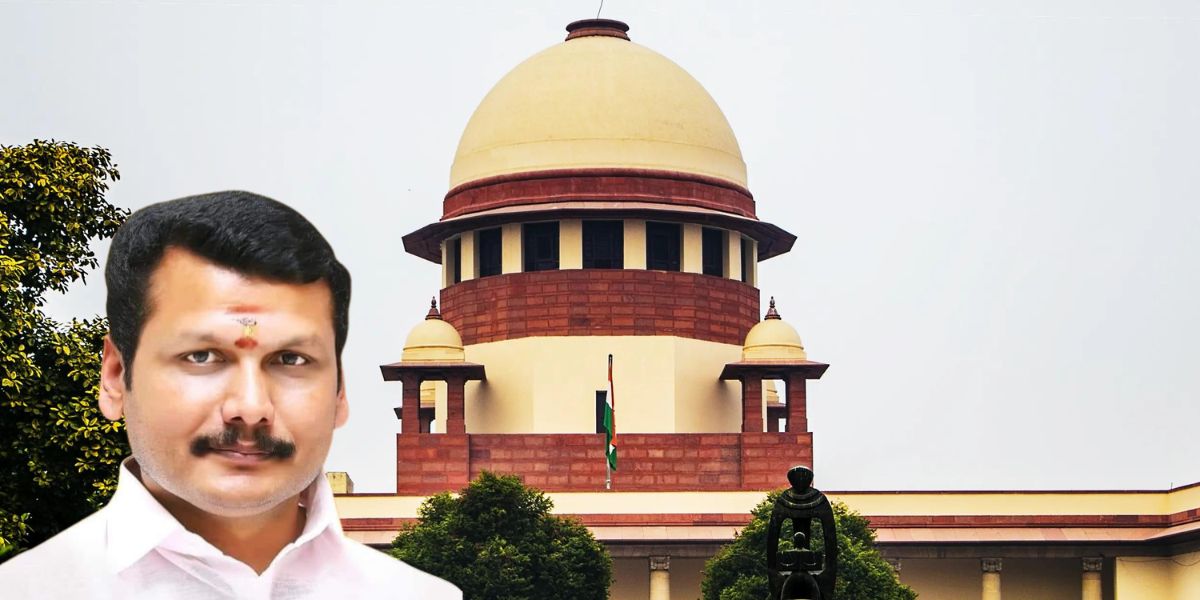The court described his reinstatement as "unacceptable" and expressed fears about potential witness intimidation and interference with the ongoing investigation.
Published Dec 02, 2024 | 3:17 PM ⚊ Updated Dec 02, 2024 | 3:17 PM

The former minister was recently granted bail by Supreme Court.
The Supreme Court on Monday, 2 December, raised serious concerns over the reinstatement of V Senthil Balaji to the Tamil Nadu Cabinet a day after he was granted bail in a corruption case.
During a hearing, the court described his reinstatement as “unacceptable” and expressed fears about potential witness intimidation and interference with the ongoing investigation.
A bench of Justices Abhay S Oka and Justice Augustine George Masih expressed its dissatisfaction with the timing of Balaji’s reinstatement. “It is unacceptable that he was reinstated as a minister the day after bail was granted.”
The bench emphasised the need to examine whether Balaji’s ministerial position could intimidate witnesses or influence the investigation. The judges clarified that their decision would hinge on whether evidence suggested his position was being misused to interfere with the case.
The court further remarked that it would not hesitate to revoke the bail if it determined that Balaji’s reinstatement posed a threat to justice and adjourned the case to 13 December for further deliberation.
Senthil Balaji, a prominent DMK leader and Tamil Nadu’s Minister for Electricity, was arrested in June 2023 by the Enforcement Directorate (ED) under the Prevention of Money Laundering Act (PMLA).
The charges against him stem from a “cash-for-jobs” scam, wherein Balaji is alleged to have accepted bribes during his tenure as Transport Minister under the AIADMK government in offering jobs in state-run transport corporations.
The ED filed a case of money laundering in July 2021 to probe these allegations based on three FIRs lodged in 2018 and complaints from some of those who failed to get the promised jobs. Balaji crossed over to the DMK in 2018.
Following his arrest, Balaji remained in judicial custody for several months. In September 2024, the Supreme Court granted him conditional bail, explicitly prohibiting him from influencing witnesses or tampering with evidence.
However, within 24 hours of his release, Balaji was reinstated as a minister and resumed his portfolios, including the Electricity and Prohibition and Excise departments.
Several petitions were filed in the Supreme Court challenging Balaji’s reinstatement and seeking cancellation of his bail.
During the hearing, the petitioners’ counsels argued that allowing Balaji to reassume ministerial responsibilities created an atmosphere of fear among witnesses and could severely impact the investigation.
“His position as a minister grants him influence that may intimidate witnesses,” the petitioners’ lawyers contended.
In response, Balaji’s legal team dismissed the allegations as politically motivated and claimed the petitions were an attempt to malign their client.
They pointed out that the ED had not formally raised concerns about an investigation being hindered and argued that media coverage had created undue political pressure on Balaji.
(Edited by Muhammed Fazil.)
